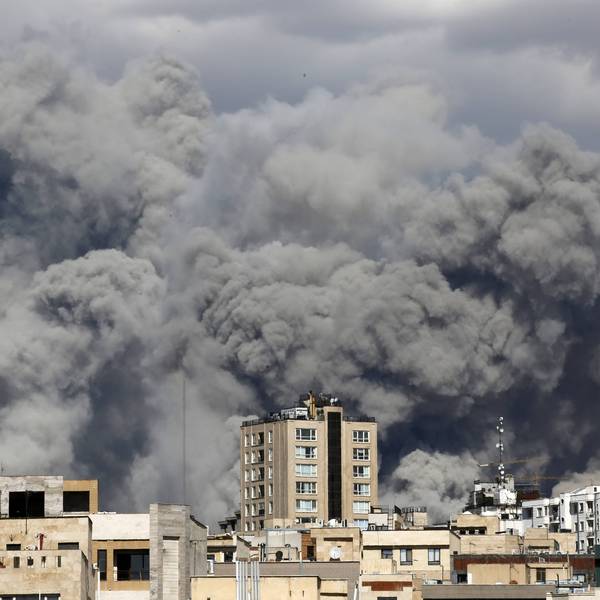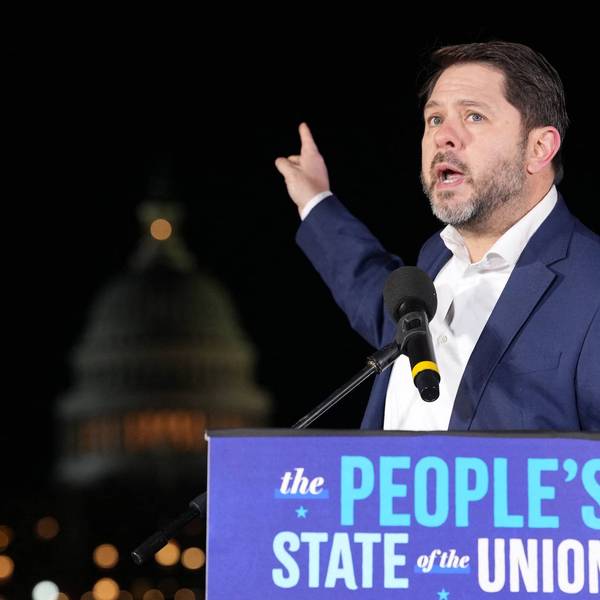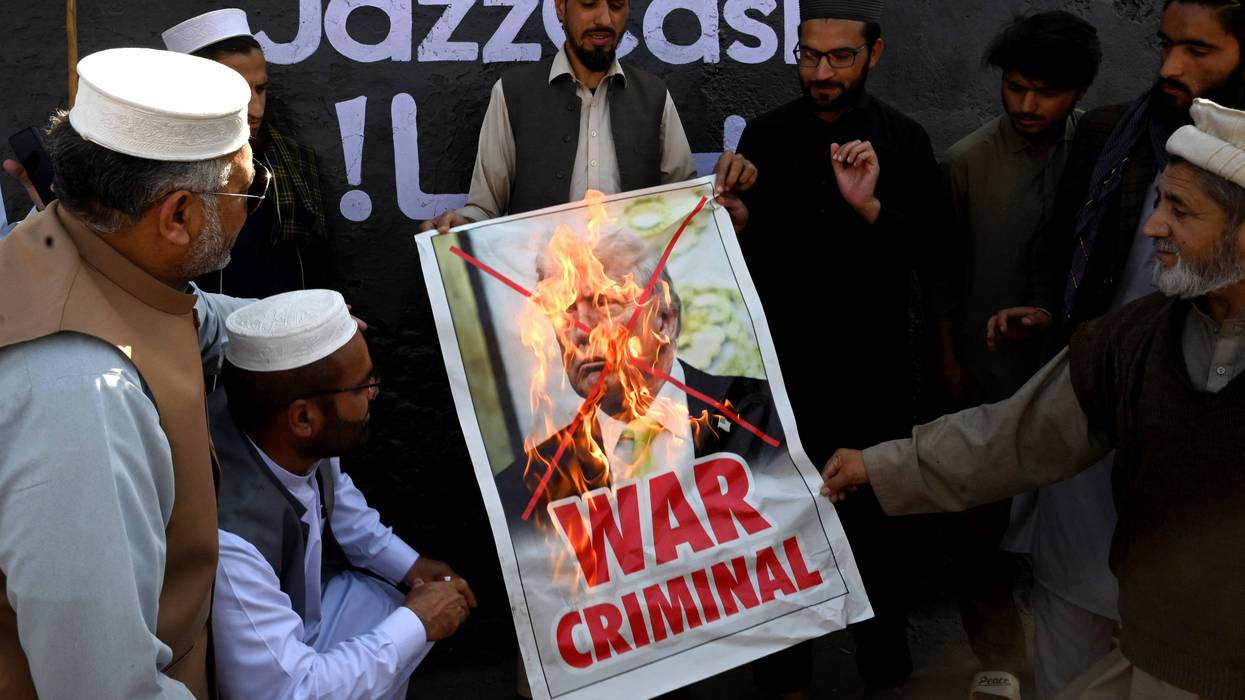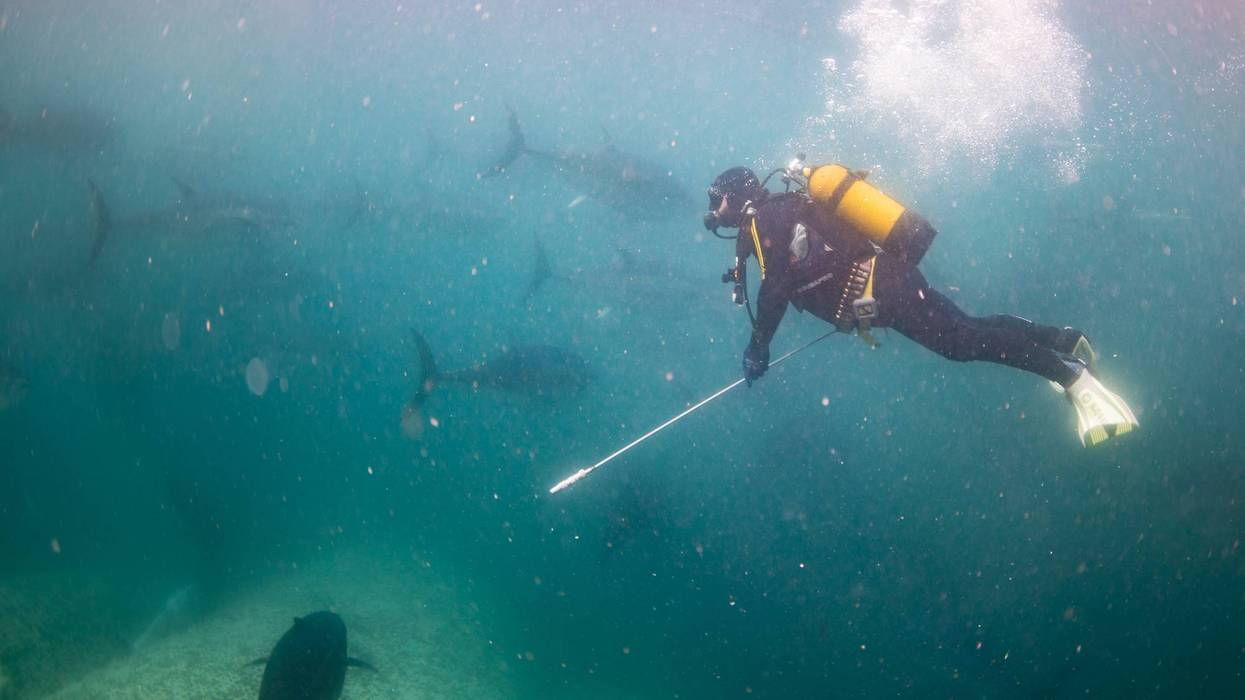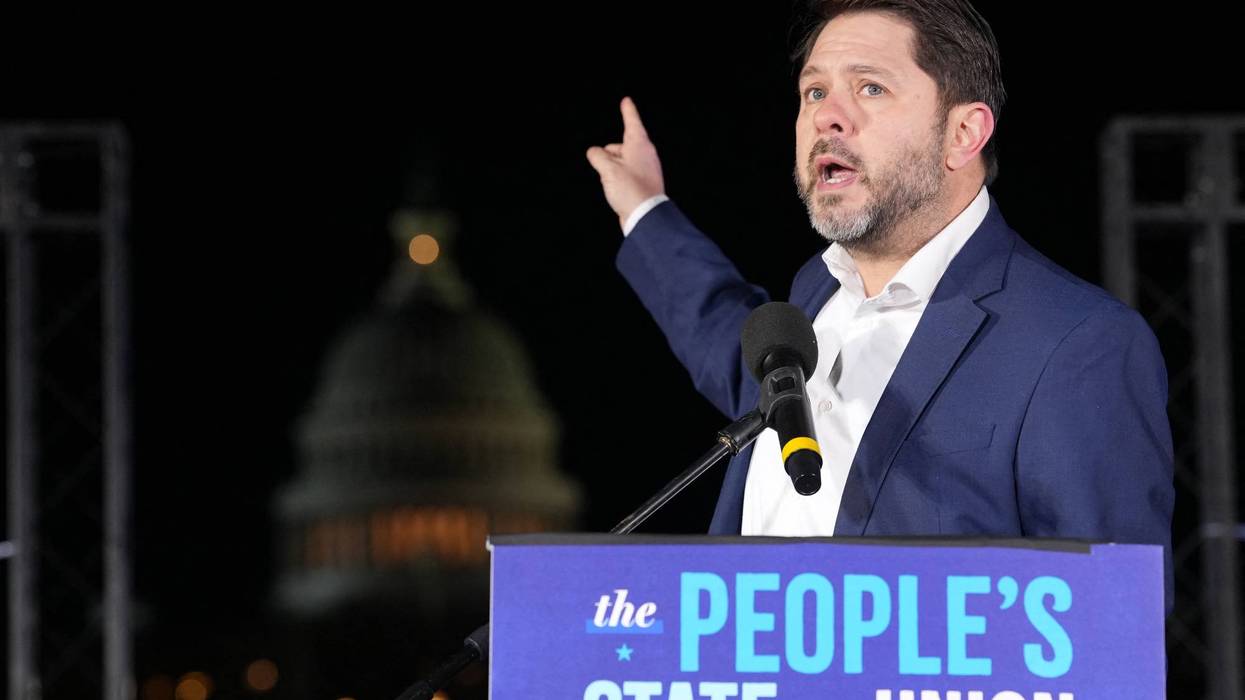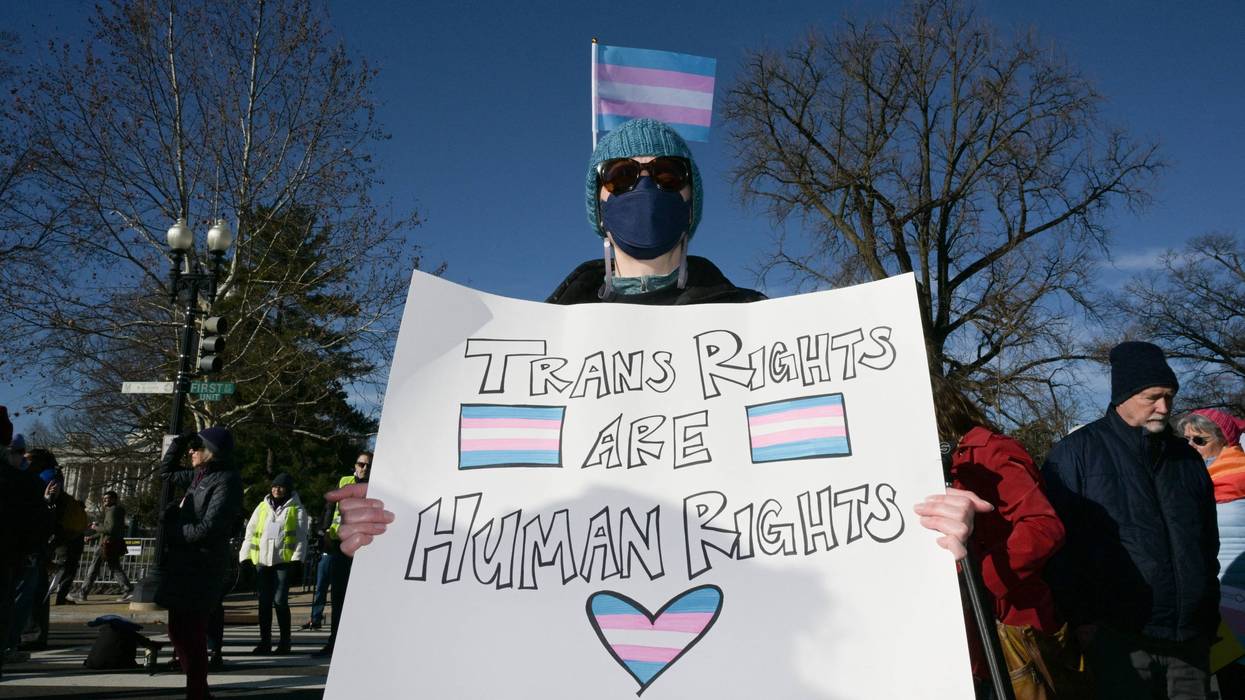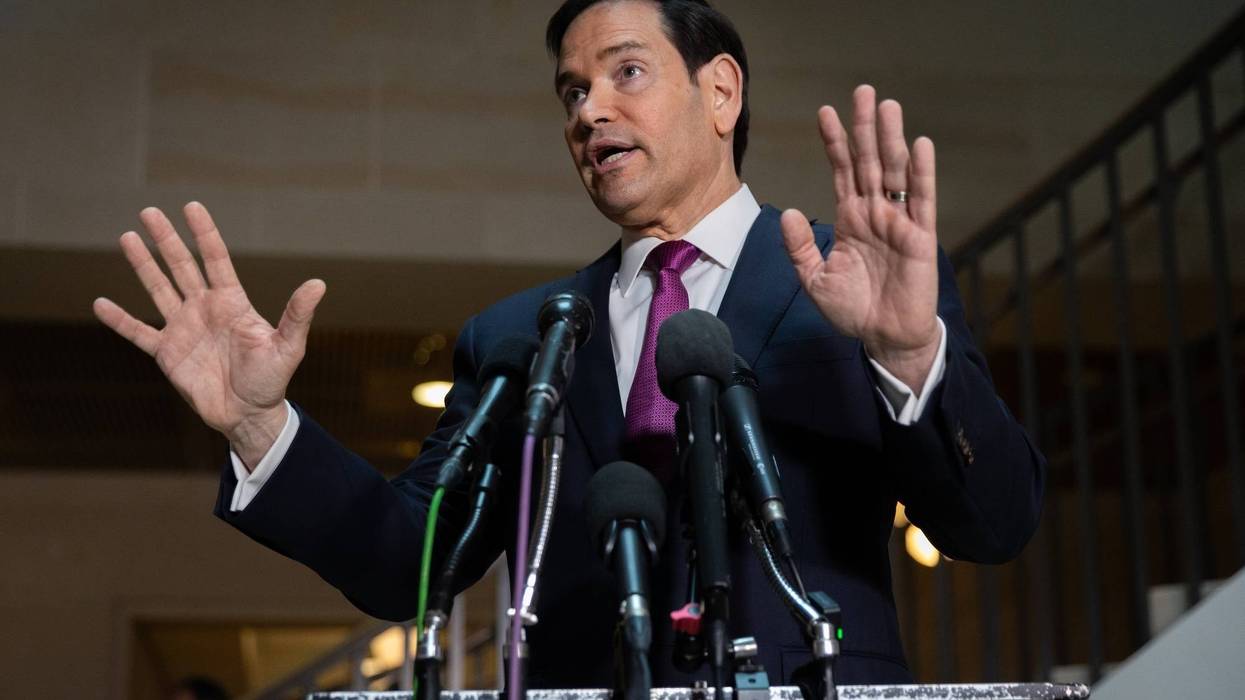LIVE COVERAGE
Ribbital: Democracy As Something We Do, Not Just Have
Most memorable about this week's longest, basest, game-show SOTU, a toxic, lying, us-and-them hate fest: The rowdy multitude of responses from a populace "defying the lie that we are powerless." Bigly upstaging a goalie's Medal of Freedom was "a marathon of truth-telling," from a cogent Dem response to the Portland Frogs leading a restive, joyful, shaggy defense of "this thing we call democracy" by We the People, insisting, "Don't be afraid to call it fascism - we got to meet this fuckin' moment."
The State of the Union speech, already a stale ritual of forced national unity, felt more farcical than ever in these rancorous times, a tawdry, surreal piece of performance art whose only true believers may be those MAGA morons who, when challenged, frantically, mindlessly yell "USA!! USA!!," their version of, "Oh yeah?!" They resorted to it several times Tuesday at a tacky event that over 70 deeply fed up Democrats skipped. "The President has shown no respect for the principles upon which this country is based," argued Maine's Sen. Angus King. "I cannot in good conscience participate in (a) function that would require me to ignore all that has gone before, and to pay him a measure of respect he has not earned." Other apt SOTU responses: Turner Classic Movies showed Gaslight, and Jeff Tiedrich proclaimed, "The State of the Union is - oh, who gives a fuck, really?"
The "18-year-long," "excruciatingly tedious," "most openly racist State of the Union in modern history" came as its perpetrator faces record-low 36% approval ratings, trailing by double digits in swing states and bleeding support among independents as he babbles about "fake polls," "silent support" and "made-up numbers" by "professional cheaters." His deplorable flunkies aren't faring any better. In a civil trial where investors are suing Elon Musk, his lawyers can't find jurors because so many Americans "hate him." They also hate ICE Barbie and her stormtroopers, and Kash Patel for his $75K, not-at-all-personal trip to Milan to chug beer with hockey players that so infuriated his own work force they sent 8 videos of it to media. There's also Rep. Tony Gonzales with another sex scandal MAGA doesn't need (though they need his seat), and perennial losers Kegseth and Pirro.
Still, given he "continues to live in a fantasyland where stuff becomes true just because he says it is," his SOTU was awesome, like his glittering State of Denial. Likely invisible were the Suffragette white outfits of Dem women, the photos of Renee Good and Alex Pretti, Rep. Al Green's sign, "Black People Aren't Apes" (he was escorted from the chamber), the "Release the Epstein Files" pins, and the stalwart, near-dozen Epstein survivors themselves invited by Dem lawmakers, reminders of ghastly new evidence and allegations and cover-ups lurking behind one key question from survivor Jess Michaels: “Does our government belong to the American people, or to those who prey on them?” There was, of course, no answer. In fact, there was no mention of Epstein. Or of the reviled ICE, stalled DHS, on-the-brink Iran, or long-suffering Ukraine on the 4th anniversary of its invasion.
There was, instead, a hate-lie-and-grievance-filled shit show, a Klan rally of "white-supremacist wolf whistles," a "fascist rally peppered with flop-sweat one-liners," a slurred, venomous, fact-free barrage of boasts, insults, puffery met with faithful Kim Jong Un-esque applause from co-conspirators filling up empty seats for an old man who endlessly burbled, lurched and clung to a podium as he hid a gross bruised hand behind him. It was, wrote Ana Marie Cox, a speech "simultaneously banal and unsettling (by) a greasy fleshhole of hate...rancid and powerful." Her trenchant analysis: "I fucking hate this guy." And no, full disclosure, we did not watch it. We just...couldn't. But sincere thanks to those strong souls who chronicled the debacle, most notably Mehdi Hassan and the folks of Zeteo here and here. Also to Jimmy Kimmel, for his fine, no-diapers introduction.
The musty lies and bombast unspooled. We were a dead country but now we're "the hottest." Dems are "suddenly using the word 'affordability' - somebody gave it to them," but high prices are all their fault. Countries hit by tariffs are "happy." Most foul were lurid tales about the "scourge of illegal immigration," like "Somali pirates who have ransacked Minnesota" and "pillaged $19 billion from the American taxpayer," though it was 80 Somali-Americans, led by a white American woman, who committed some fraud while over 100,000, 95% of them U.S. citizens, pay nearly $70 million in taxes and contribute $8 billion to the community but sure let's go with a collective ethnic smear. The crude, dumb, divisive finale: Stand if you agree your first duty is "to protect American citizens, not illegal aliens" - and don't forget the Seig Heil. Cheap Theatrics 'R Us.
Dems sat. Trump raged, "You should be ashamed." Ilhan Omar fought back: "You should be ashamed. You're killing Americans." MAGA yelled "USA!" Goebbels Miller shrieked “0 democrats stood for the (principle) leaders must serve citizens before invaders. Never has there been a more stunning moment in Congress." True, but not how he thinks. In a final, Oprah moment, the "merit vampire" who thrives on stolen glory bragged, "We’re winning so much we don’t know what to do about it" and to prove it here's the carefully choreographed USA Olympic hockey team who jeered with him in the locker room about their women cohorts who won bigger: "Come on in!" The MAGA frat party dregs cheered, hooted, fist-pumped more "USA!" Then he gave out medals, and fed the athletes Big Macs. Press Barbie: "He knows how to celebrate champions. No one does it like him!"
Ugh. The flip side: Kudos to the five hockey players, and the moms who likely largely raised them, who declined the non- invite; four of five came from Minnesota. And kudos to Public Enemy Hall of Fame rapper Flavor Flav, a longtime supporter of women's sports, who invited the women's team to party in Las Vegas and "celebrate for real for real" in July on a She Got Game weekend funded by him and area resorts. And gracious thanks to actor, gourmand and all-round mensch Stanley Tucci, who hosted the women on the patio of his favorite Milan restaurant, the Michelin-starred Ristorante Ratanà, where they happily feasted on pumpkin risotto and just desserts. Meanwhile, in the wake of the mad king's claptrap, Democrats won three local elections in swing states: two in Pennsylvania for a majority in the state house, one in Maine, further cementing Democrats’ hold.
Finally, there were myriad, heartening alternative events where lawmakers, advocates, Epstein survivors and whistleblowers vowed to, "Lean in, stand up and show up" in defense of democracy and fierce resistance - and stark contrast - to the small, mean narcissist down the road making up "facts" and boasting about stripping 2.4 million people of food stamps. The official Democratic response, from Virginia Gov. Abigail Spanberger, was succinct and forceful. Citing the pernicious rhetoric, cruelty, cover-ups, scams, ballrooms, she asked who benefits: "Is the president working for you? We all know the answer is no." Sen. Alex Padilla pointedly gave a follow-up in Spanish. Famously last seen getting tackled by DHS thugs for daring to ask ICE Barbie about her brownshirts' violent abuses, he asserted, "I am still here. Still standing. Still fighting."
His sense of resolve was echoed at a "People’s State of the Union” rally on the National Mall held by MoveOn and Meidas Touch, where speakers lambasted Trump's imaginary "Golden Age of America" in a country that in fact offers "one reality for everyday people and another for the rich and well-protected." Citing vast unmet needs on healthcare, housing, jobs, Pennsylvania Rep. Summer Lee of the Working Families Party vowed to "elevate the voices of (those) angry, scared and fed up with an administration that’s done nothing to help and a lot to hurt everyday people." Sen. Chris Murphy decried a speech ignoring ICE "tear-gassing schools, murdering citizens, and disappearing legal immigrants." The Progressive Caucus' Greg Casar reviled a $4-billion grifter "lecturing you, the American people, about how good you have it (when) everyone but Trump’s rich friends knows it’s a disaster,."
Meanwhile, at the National Press Club a few blocks away, a dozen members of the illustrious Portland Frog Brigade headlined a giddy, heartfelt, sold-out State of the Swamp, a SOTU "ribbital" hosted by DEFIANCE.org and advocacy media network Courier where attendees were encouraged to gather, preferably in frog caps, in "peaceful defiance and civic participation." M.C.'ed by Defiance head and former Trump staffer Miles Taylor, the event drew dozens of speakers, and a few frogs, who over several hours gave resolute, kinetic, briskly-3-minute speeches focused on the vital need to remember that, "Democracy is something we do, not just something we have." The most substantial time went to the last three speakers - the combative mayors of Minneapolis and Chicago, and an enraged Robert DeNiro - and they were all electrifying.
The mood was chill, festive, occasionally profane, but the message was consistent: In the face of unprecedented threats to our democracy by "a rapist vulgarian named Donald Trump," we must, "Refuse to shut up, sit down, or even stop ribbiting. Stay LOUD." Between speakers, video clips showed historic figures of defiance: MLK Jr, Muhammad Ali, Black Panthers, James Baldwin, John Lewis, lunch-counter sit-ins, Jesse Jackson rousing Sesame Street kids to say, "I am somebody." Next to the stage, about 20 inflatable frogs, "the jesters of this movement," stood and often danced in a "frog pond" with signs: "Damn Straight," "Amphifa," "Frogs Not Fascists." Earlier, they'd hit the Capitol to hand out pocket Constitutions to members of Congress and toured D.C. for proud green selfies. Taylor: "Who better to help navigate the swamp than a creature born in the swamp?"
Despite the focus on matters of substance - housing, healthcare, climate crisis, ICE abuses, democracy itself - the tone of many speakers was light-hearted and self-deprecating. Delaware Gov. Matt Meyers: "There are more frogs in this room than people in my state." New York Rep. Dan Goldman: "It's great to be here and not in Congress tonight." Oregon Sen. Ron Wyden on his political low profile: "I'm barely a household name in my own household." Oregon Rep. Maxine Dexter: "Thank you to the frogs who hopped across the country." The array of speakers was admirably broad - from a panel of First Amendment legal defenders to former White House Press Secretary Stephanie Grisham - and outspoken on "the weak, dumb, small, sad man" and "pathetic whiny loser who knocked down the East Wing and thinks he can knock down our democracy."
Colorado Rep. Jason Crow, one of the six veterans along with Mark Kelly under attack by Kegseth for re-iterating that the military should follow the law, began with, "Well, President Trump keeps trying to put me in prison. But I've never been very good at sitting in my foxhole and letting them send grenades my way. I fight back." Motormouth Joe Walsh, former "rock-ribbed" conservative and Illinois GOP rep with serious buyer's remorse, and author of the 2020 book Fuck Silence: Calling Trump Out for the Cultish, Moronic, Authoritarian Con Man He Is, was resolute on the "cruel bastard" who gave us Jan. 6 and "don't you for one moment think he's not gonna try" to mess with coming elections: "This moment calls for all of us to be courageous - we ain't never been here before. Our job is to blow him outta the water. Fuck Trump. The mid-terms are happening."
Over hours, their messages aligned: Fascists come after everyone in the end, even fellow fascists. MAGA is waiting its turn in the trashbin of history. Help put it there. Courage is more contagious than cowardice. An old story is dying. The elites have never been the ones to save us - it's always the people. Cruelty isn't strength, nor is defying the rule of law. Strength is the moral courage to say this is not right, to see other people as fully human. When empathy disappears, authoritarianism is next. Gutsy Minneapolis Mayor Jacob Frey: "We are not spectators in this moment. We are stewards of our democracy. Hold strong." DeNiro, on feeling "betrayed" by today's America, "like an abused spouse professing love for their abuser." "You have to lift people up," he said, his voice cracking. "If you've ever loved your country, this is the time to show it."
The aftermath of a grotesque SOTU tells us everything we need to know about the historic moment. Trump raged about "the bulging, bloodshot eyes of crazy people" who declined to stand with his fascism: "We should send them back (on) a boat with Robert DeNiro, another sick and demented person....saying (things) seriously CRIMINAL!" News surfaced that, during the speech, Ilhan Omar guest Aliya Rahman, a disabled Minneapolis woman dragged from her car by ICE who later gave searing testimony to Congress, was forcibly removed by Capitol Police and charged with "Unlawful Conduct" after she silently stood up in the gallery, like many others. On Friday, Trump held a million-dollar-a-plate, "Billionaires first, Americans last" fundraiser. And the day before, NYC Mayor Mamdani, with the help of AOC, released an adorbs video about his new free child care program. Which side are you on? Tough call.
Big Tech's 'AI Climate Hoax': Study Shows 74% of Industry's Claims Unproven
A report released on Tuesday says that the tech industry is blowing hot air with its claims that generative artificial intelligence will be beneficial for the climate.
The report, titled "The AI Climate Hoax," was commissioned by a broad consortium of environmental advocacy organizations and authored by climate and energy analyst Ketan Joshi.
In total, it analyzes more than 150 statements made by both big tech companies and organizations such as the International Energy Agency about the supposed benefits of generative AI.
The report finds that 74% of such claims made by these institutions are unproven, with 36% not bothering to cite any evidence whatsoever.
One key finding in the report is that many claims about the purported benefits of the technology conflate traditional AI systems with more recent generative AI systems, which require massive amounts of energy and are spurring demand for the construction of power-and-water-devouring data centers across the US.
"Even if these benefits are real," the report writes of traditional AI systems, "they are unrelated to—and dwarfed by—the massive expansion of energy use from the generative AI industry," which is projected to to consume 13 times as much energy as traditional AI by the year 2030.
Even the more supportable claims about the benefits of traditional AI deserve serious scrutiny, the report notes, since "they tend to rely on weaker forms of evidence, such as corporate websites, rather than published academic research," which was only cited in 26% of claims made about AI benefits.
The report also knocks big tech companies for using assorted strategies to conceal the true extent of their energy use, including buying renewable energy certificates even while relying on fossil fuels to power their operations, and vowing to implement highly implausible solutions to mitigate the climate impact of data centers, including carbon capture technologies and even building orbital data centers in space.
Commenting on the report, study author Joshi said its findings seem to show "tech companies are using vagueness about what happens within energy-hogging data centers to greenwash a planet-wrecking expansion."
"The promises of planet-saving tech remain hollow, while AI data centers breathe life into coal and gas every day," Joshi added. "These claims of climate benefit are unjustified and overhyped, and could cover up irreversible damage being done to communities and society."
Jill McArdle, international corporate campaigner at study sponsor Beyond Fossil Fuels, said the study shows "there is simply no evidence that AI will help the climate more than it will harm it," and accused Big Tech companies of "writing themselves a blank cheque to pollute on the empty promise of future salvation."
AI data centers have become a major controversy throughout the US in recent months, as their massive energy needs have pushed up utility bills and put a strain on communities’ water supplies.
A study published in the journal Nature Sustainability last year found that data centers could soon consume as much water as 10 million Americans and emit as much carbon dioxide as 10 million cars, or roughly the same amount of consumption as the entire state of New York.
Report Details How Trump Economic Agenda ‘Will Make Ordinary Families Reliably Poorer in the Future’
President Donald Trump's economic agenda "will make ordinary families reliably poorer in the future," according to the author of a report published Tuesday by the Economic Policy Institute.
Josh Bivens, EPI's chief economist, said Trump's slashing of federal spending and jobs, mass deportations, chaotic tariffs, and anti-labor policies were suppressing hiring and wages, draining household and business spending, and slowing economic growth.
While a recession is not yet inevitable, Bivens argued that worrying signs are already on the horizon, with 1.4 million fewer new jobs than expected in 2025 and unemployment ticking up to 4.4%, up from the low of 3.4% in April 2023.
For low-wage earners, the past year has been particularly rough. After seeing unusually fast growth during the presidency of Joe Biden, real wages for the bottom 10% of earners fell by 0.3% in 2025.
The report predicts that Republicans' 2025 budget package will reduce “aggregate demand” in the coming years. The so-called One Big Beautiful Bill Act cuts $100 billion annually from Medicaid and the Supplemental Nutrition Assistance Program (SNAP), while allowing health insurance subsidies that saved families thousands to expire, which the report projects will cause many families who rely on these benefits to pull back spending in the economy.
While the law reduced taxes, the vast majority of those benefits went to the wealthiest earners, whose spending was already much less constrained by their incomes.
The report notes the astonishing increase in inequality caused by the law. Between the years of 1979 and 2019, which were considered to have seen an explosion of wealth inequality, the share of income claimed by the richest 10% increased by about 0.25% per year.
It found that the GOP budget law will, in just one year, increase the top decile's share of wealth by a full percentage point. In other words, the rate of inequality will "quadruple in its first year."
Aside from this major driver of inequality, the report also says that the Trump administration's hostility toward collective bargaining rights and its mass firings of federal workers would further suppress wages by making the labor market less competitive, and that the president's erratic tariff regime would make those wages less valuable by fueling inflation.
“Disastrous policy choices that led to excess unemployment, slower growth in the economy’s productive capacity, and rising inequality have made life less affordable for typical families in recent decades," Bivens said. "The Trump administration’s policies double down on the worst policy decisions of this period and will make ordinary families reliably poorer in the future, even if an outright recession or spiking inflation does not happen."
'Antitrust Disaster': Son of Billionaire Trump Donor Poised to Take Over Warner Bros.
Netflix announced Thursday that it would not continue its effort to acquire Warner Bros. Discovery, paving the way for Paramount Skydance—a company controlled by the son of billionaire Trump donor Larry Ellison—to take over the media giant after a lengthy bidding war.
The news came after Netflix CEO Ted Sarandos visited the White House and met with members of President Donald Trump's staff, raising suspicions about the role the administration may have played in pushing the streaming giant to drop its bid for Warner Bros. and cede the fight to David Ellison's Paramount. Along with other major media properties, Warner Bros. owns CNN, a frequent target of Trump's ire.
"What did Trump officials tell the Netflix CEO today at the White House?" asked Sen. Elizabeth Warren (D-Mass.), calling the potential Paramount-Warner Bros. merger "an antitrust disaster threatening higher prices and fewer choices for American families."
"A handful of Trump-aligned billionaires are trying to seize control of what you watch and charge you whatever price they want," Warren added. "With the cloud of corruption looming over Trump’s Department of Justice, it’ll be up to the American people to speak up and state attorneys general to enforce the law."
In a statement that appears to have stunned Hollywood, Netflix announced Thursday that it would not raise its offer for Warner Bros. after that company's board deemed Paramount's latest offer of $111 billion "superior." Netflix said it determined the pursuit of Warner Bros. was "no longer financially attractive."
"Ellison will readily throw the First Amendment, CNN’s reporters, and HBO’s filmmakers under the bus if they stand in the way of expanding his corporate empire and fattening his pockets."
Ellison, for his part, said he was "pleased" that the Warner Bros. board "affirmed the superior value of our offer, which delivers to WBD shareholders superior value, certainty, and speed to closing."
The proposed Paramount-Warner Bros. merger still must receive regulatory approval in the US and Europe. Critics have voiced concerns about the legitimacy of a US Justice Department review given the recent ouster of antitrust chief Gail Slater.
State attorneys general could also intervene. Rob Bonta, the attorney general of California, emphasized in a statement that "Paramount/Warner Bros is not a done deal."
"These two Hollywood titans have not cleared regulatory scrutiny—the California Department of Justice has an open investigation, and we intend to be vigorous in our review," said Bonta.
On top of antitrust concerns, critics of the potential Paramount-Warner Bros. merger warned it would be a disaster for journalism and free expression. David Ellison acquired CBS News last year through the Paramount-Skydance merger approved by the Trump administration, and he is now poised to take over CNN, HBO, and other major platforms.
"Ellison has already shown his cards," said Seth Stern, chief of advocacy at the Freedom of the Press Foundation. "When the Trump administration unconstitutionally demanded editorial concessions from Ellison’s Skydance in exchange for government approval of its takeover of Paramount and CBS News, he obliged, even appointing a Trump loyalist as a so-called ‘bias ombudsman.’ CBS has since repeatedly censored journalists or altered its coverage to please Trump and his allies."
"There is no reason to believe that this proven capitulator will behave any differently this time around—in fact, he’s already reportedly promised Trump ‘sweeping changes’ at CNN, including firing people Trump dislikes," Stern said. "Ellison will readily throw the First Amendment, CNN’s reporters, and HBO’s filmmakers under the bus if they stand in the way of expanding his corporate empire and fattening his pockets."
"Lawmakers, state attorneys general, and anyone else in a position to intervene should make clear that they will not stand by as the Trump administration abuses its power to unconstitutionally extract content-based concessions from news companies," he added.
'A Global Failure': UN Says 7,667 People Died or Went Missing on Migration Routes in 2025
A United Nations organization announced Thursday that at least 7,667 people died or went missing on migration routes worldwide last year—or around 21 migrants per day—but "the real toll is likely higher."
"Sea crossings remained among the deadliest routes," according to the International Organization for Migration. IOM found that at least 2,185 people died or went missing in the Mediterranean Sea, and another 1,214 on the Western Africa/Atlantic route toward the Canary Islands.
Nearly two months into a new year, the trend in the Mediterranean has persisted. IOM pointed to the "unprecedented number of migrant deaths in the first two months of 2026, with 606 recorded" as of Tuesday.
"The continued loss of life on migration routes is a global failure we cannot accept as normal," said IOM Director General Amy Pope in a statement. "These deaths are not inevitable. When safe pathways are out of reach, people are forced into dangerous journeys and into the hands of smugglers and traffickers."
"We must act now to expand safe and regular routes, and ensure people in need can be reached and protected, regardless of their status," Pope asserted.
Despite such calls, the European Union has worked to curb migration to the continent with its Pact on Migration and Asylum—which has been condemned as a "bow to right-wing extremists and fascists," and is set to take effect next June—and the related "return regulation" that the Council of the EU finalized in December.
"The EU is legitimizing offshore prisons, racial profiling, and child detention in ways we have never seen," Sarah Chander, director at the Equinox Initiative for Racial Justice, said of the council's move last year. "Instead of finding ways to ensure safety and protection for everybody, the EU is pushing a punishment regime for migrants, which will help no one."
Reporting on the new IOM data, Politico noted Thursday:
The EU's priority now is "about bringing illegal arrivals to a minimum and keeping those numbers there," Migration Commissioner Magnus Brunner said when presenting the bloc's migration strategy in January.
That's "not as an end in itself," he said, but reduces pressure on EU countries, prevents abuse, reinforces people's trust in the EU, and helps save lives. "Any smuggling trip prevented is potentially a life which we save."
As a next step, the EU "must address migration along the whole route," including by ensuring protection for people in need "closer to the point of departure," Brunner said.
Meanwhile, in the Americas, US President Trump returned to power in early 2025, having campaigned on a promise of mass deportations. He's aimed to deliver on the pledge by deploying federal agents to various cities, where they have terrorized immigrants and citizens alike with civil rights violations and, in some cases, fatal shootings.
IOM only recorded 409 deaths in the Americas last year, the lowest annual total since its data collection began in 2014. The organization said that "this is likely due to fewer people taking dangerous irregular pathways, such as crossing the Darien Jungle or the US-Mexico border. However, lags in reporting from officials means that the figures for 2025 in the Americas likely will not be finalized until mid-2026."
The overall figure is also down, from nearly 9,200 in 2024. However, IOM explained that "the decline reflects fewer people attempting dangerous irregular migration routes, particularly in the Americas, but is also due to restricted access to information and funding constraints for humanitarian actors documenting migrant deaths on key routes."
IOM called for "urgent funding to strengthen data collection to better guide the humanitarian system in delivering lifesaving responses."
Reuters highlighted that "the Geneva‑based organization is among several aid groups hit by major US funding cuts, forcing it to scale back or close programs in ways it says will severely impact migrants."
'Don't Support Bootlickers': ChatGPT Subscribers Vow Mass Cancellations After Pentagon Deal
Calls to boycott OpenAI have been growing over the last several days after the artificial intelligence giant reached a deal with the US Department of Defense to use its ChatGPT chatbot across its classified network.
OpenAI CEO Sam Altman on Friday said that the deal reached with the Pentagon would have "prohibitions on domestic mass surveillance" and maintain "human responsibility for the use of force, including for autonomous weapon systems."
The DOD had previously gotten into a dispute with AI firm Anthropic, which refused to modify its Claude chatbot to allow for its use for domestic spying or to make final decisions on whether to take a human life.
President Donald Trump announced on Friday that he'd ordered the US military to stop using Anthropic's technology, describing the firm as "A RADICAL LEFT, WOKE COMPANY" in a Truth Social post.
Shortly after Trump's post, Altman announced that OpenAI had reached a deal with the Pentagon. This led many critics to suspect that, whatever Altman's denials, the DOD would be allowed to use ChatGPT in ways that it had been forbidden to utilize Claude.
Adam Cochrane, who runs activist venture capital firm Cinneamhain Ventures, said immediately after Altman's announcement that he was canceling his ChatGPT subscription on the grounds that "I don’t support bootlickers."
Dr. Simon Goddek, a biotech scientist, also revealed that he was canceling his ChatGPT subscription and encouraged others to do the same.
"Companies understand one language: MONEY," he wrote. "If they support wars of aggression, they can’t profit from me. I’m out. What’s stopping you?"
AI consultant Mark Gadala-Maria accused Altman of being two-faced with his DOD deal, noting that the OpenAI CEO had expressed solidarity with Anthropic in the face of the Trump administration's attacks.
"Just a few hours ago he was on TV saying he stood by Anthropic," wrote Gadala-Maria. "Then he undercuts them and takes the same contract that Anthropic just lost. How can anyone trust this guy?"
An OpenAI boycott group called "QuitGPT" went online shortly after Altman's announcement, and the organization claims that it has gotten more than 1.5 million people to cancel their ChatGPT subscriptions or stop using it all together.
QuitGPT also outlined why its boycott of OpenAI could be potentially effective given the highly competitive nature of the current consumer AI market.
"ChatGPT is the biggest chatbot in the world, but that advantage is fragile," QuitGPT explained. "ChatGPT has been losing market share. Their creator, OpenAI, is losing three times more than they earn. ChatGPT users skew young and progressive, and many don't know about alternatives. We can push OpenAI over the edge."
Rubio Suggests Trump Joined Israel's Planned Attack on Iran Instead of Stopping It
"This is the most insane and absurd definition of an 'imminent threat' I have ever heard in my life," said one journalist.
"What the fuck happened to America First?" US Sen. Ruben Gallego asked on social media Monday in response to a video of Secretary of State Marco Rubio attempting to justify President Donald Trump and Israeli Prime Minister Benjamin Netanyahu's war on Iran.
As the death toll climbed above 550 in Iran, with at least six US service members killed, Rubio told reporters on Capitol Hill that "there absolutely was an imminent threat, and the imminent threat was that we knew that if Iran was attacked, and we believed they would be attacked, that they would immediately come after us. And we were not gonna sit there and absorb a blow before we responded."
According to Rubio, the US Department of Defense assessed that "if we waited for them to hit us first after they were attacked... by someone else—Israel attacked them, they hit us first, and we waited for them to hit us—we would suffer more casualties and more deaths. We went proactively, in a defensive way, to prevent them from inflicting higher damage. Had we not done so, there would've been hearings on Capitol Hill about how we knew that this was gonna happen, and we didn't act preemptively to prevent more casualties and more loss of life."
In a follow-up post, Gallego (D-Ariz.), an Iraq War veteran, added: "So Netanyahu now decides when we go to war? So much for America First."
The senator wasn't alone in ripping Rubio's remarks. Congresswoman Sarah Jacobs (D-Calif.) said that "Secretary Rubio says the quiet part out loud: This is an unnecessary war of choice. Israel forced our hand—there was no imminent threat to the United States. And instead of talking Israel out of going to war, President Trump went along with it and put US lives at risk."
Stanford University political science professor Michael McFaul said: "Such strange logic. We had to go to war because Israel was going to attack Iran? So Bibi gets a say as to whether the US goes to war but the US Senate and the American people do not?"
Zeteo editor-in-chief Mehdi Hasan declared: "This is the most insane and absurd definition of an 'imminent threat' I have ever heard in my life. Our ally and proxy, Israel, that we arm and fund, was about to illegally attack Iran so we joined in the attack because that illegal attack would have led to an attack on us."
Progressive organizer and attorney Aaron Regunberg also weighed in on social media: "Quite literally—and I've used that word too freely in the past, but in this case I mean literally—Rubio is saying they've made America into Netanyahu's bitch. We go where Bibi points, regardless of the American blood it will cost. Trump is an absolute cuck. Pathetic."
While critics of Trump's "Operation Epic Fury" have slammed it as illegal and clearly motivated by regime change, Rubio claimed that the Trump administration would welcome a new government in Iran, but the war—which has taken out top Iranians, including the supreme leader, Ayatollan Ali Hosseini Khamenei—is about preventing the Middle Eastern nation from developing a nuclear weapon.
A year ago, a US intelligence report said that "we continue to assess Iran is not building a nuclear weapon and that Khamenei has not reauthorized the nuclear weapons program he suspended in 2003, though pressure has probably built on him to do so." Despite that conclusion, the Trump administration bombed the country's nuclear facilities a few months later—and, as CNN's Aaron Blake pointed out last week, Trump has repeatedly said that his June airstrikes "obliterated" Iran's program.
There are now mounting calls for the Republican-controlled Senate and House of Representatives to end Trump's assault on Iran by passing a war powers resolution. Despite the US Constitution giving Congress clear authority to declare war, several presidents have taken military action without any such declaration.
Discussing the administration's interaction with Congress about Iran, Rubio said Monday that "we notified the Gang of Eight," which is made up of the Senate and House leaders for both major parties, as well as the chairs and ranking members of each chamber's intelligence panel. Before taking on his current role, the secretary was the top Republican on the Senate Intelligence Committee.
"There's no law that requires us to do that. The law says we have to notify them 48 hours after beginning hostilities. We've done that," Rubio said, referring to a requirement in the War Powers Act of 1973. "But we can't notify 535 members of Congress."
"If they want to take a war powers vote, they can do that. They've done that. They’ve done that a bunch of times," he added. "There's no law that requires the president to have done anything with regards to this... No presidential administration has ever accepted the War Powers Act as constitutional—not Republican presidents, not Democratic presidents."
Congressman Ted Lieu (D-Calif.) responded: "Dear Secretary Rubio: There is a law. It's called the frickin' Constitution of the United States."
Separately on Monday, the State Department urged Americans to leave a list of Middle Eastern countries.
Lieu responded: "Dear Secretary Rubio: You told Americans to depart now via commercial means when you know many airports/airspace are closed. YOU MUST IMMEDIATELY SCHEDULE US GOVERNMENT EVACUATION FLIGHTS FOR THE STRANDED AMERICANS IN DANGER. Maybe you should have thought of a frickin' plan first."
Will Others Follow? Spain Denies Use of Its Bases to US Military for Iran Attacks
"Europe should close all of the US bases on its soil," said one US foreign policy critic.
The Spanish government has blocked the US military from using its bases to launch attacks on Iran, forcing American aircraft to leave the country.
Speaking at the annual Mobile World Congress conference in Barcelona on Sunday, Spanish Prime Minister Pedro Sánchez denounced that US war on Iran, which was completely unprovoked.
"Remember that one can be against a hateful regime, as is the case with the Iranian regime," Sánchez said, "and at the same time be against a military intervention that is unjustified, dangerous, and outside international law. That one should be against a war initiated without authorization from the US Congress or the UN Security Council."
Spain’s Prime Minister Pedro Sánchez on Iran:
“Remember that one can be against a hateful regime, as is the case with the Iranian regime … and at the same time be against an unjustified, dangerous military intervention outside of international law.” pic.twitter.com/Nv0V4pfXeG
— Anonymous (@YourAnonCentral) March 2, 2026
According to a Monday report in the Guardian, Spanish Foreign Minister José Manuel Albares emphasized after Sánchez's speech that Spanish military bases will not be used "for anything that is not in the agreement [with the US], nor for anything that isn’t covered by the UN charter."
In the wake of the Spanish government's announcement, anti-war campaigners demanded that other European nations take similar stances.
"Europe should close all of the US bases on its soil," wrote David Adler, co-general coordinator of Progressive International. "There can be no 'strategic autonomy' while the United States maintains the ability to commit wanton violence from imperial installations on European territory."
Alex Soros, chairman of Open Society Foundations, said that more nations should follow in Spain's footsteps in trying to curb US aggression.
"Why aren’t more Europeans standing up to an illegal war!" Soros wrote. "Same with Canada! They make nice speeches at conferences, but do little. Spain is becoming the leader of the free world!"
Clare Daly, an Irish former member of European Parliament, encouraged her country to do its part to deny the US a base for airstrikes.
"Spain has denied the US military any use of its territory to carry out unlawful acts of aggression against Iran," Daly wrote. "Yesterday [Human Rights Organization] Shannonwatch documented two US Air Force Hercules C-130H aircraft landing at Shannon Airport. Is the government going to do anything to uphold Ireland's international responsibilities?"
Alan McLeod, senior staff writer at MintPress News, quipped that the Spanish government "continues to provide more resistance to Trump's agenda than all Democrats combined."
'Unlike the United States,' Says Security Chief, Iran 'Has Prepared Itself for a Long War'
"Trump plunged the region into chaos with his 'delusional fantasies' and now fears more American troop casualties," said the secretary of the Iranian Supreme National Security Council, Ali Larijani.
As US President Donald Trump unleashed a barrage of bombings on Monday in what is rapidly spiraling into a regional conflagration, Iran's security chief said the country is ready for a long war, but questioned whether the US is prepared for the same.
“Trump plunged the region into chaos with his ‘delusional fantasies’ and now fears more American troop casualties,” said Ali Larijani, the secretary of the Iranian Supreme National Security Council, in a post on social media Monday. “With his delusional actions, he turned his self-made 'America First' slogan into 'Israel First' and sacrificed American soldiers for Israel’s power-hungry ambitions.”
"Iran, unlike the United States, has prepared itself for a long war," he said.
Just before US-Israeli strikes began this weekend, Iran reportedly offered Trump a deal that included Iran giving up all of its enriched uranium and full cooperation with international nuclear inspectors—terms even more conciliatory than those in the original Iran nuclear agreement that Trump ripped up during his first presidency.
But now the US and Israel have taken out several senior Iranian officials, including Supreme Leader Ayatollah Ali Khamenei, and included what some observers described as the "carpet bombing" of Tehran, including heavily populated civilian areas, Larijani has declared diplomacy off the table.
"We will not negotiate with the United States," he wrote on social media, disputing reports that he'd restarted talks with Washington.
With diplomatic avenues once again blown up, Iran has shifted toward making a war maximally costly for the US and Israel and deterring its other Arab allies from joining.
At least four US military personnel have already been killed, and four others seriously wounded in attacks at military bases in Kuwait. Trump has acknowledged that more casualties are "likely," which may further heighten the backlash among the American public, which already largely does not support the war, according to a poll released this weekend.
All six of the Gulf nations that host US military bases—including Saudi Arabia, the United Arab Emirates, Qatar, Oman, and Bahrain—have been hit with Iranian missiles and drones, with some attacks spilling into civilian areas—including Dubai's and Kuwait’s international airports, as well as luxury hotels and residential skyscrapers, which resulted in at least three reported civilian deaths.
Israel has also been pummelled with artillery from Iran and its allied militia Hezbollah in Lebanon. Strikes from Iran have reportedly killed at least 11 people and left dozens more injured in Israel, according to local authorities. Israel has retaliated with a massive attack on Lebanon, which the Lebanese health ministry has said killed at least 31 people.
While Iran lacks the military might of the US and Israel, it is likely seeking to deploy its arsenal of cheaper, older drones to deplete the two powerful countries' expensive air defense systems and force them into a war of attrition, according to Amos C. Fox, a professor at Arizona State University’s Future Security Initiative, and Franz-Stefan Gady, an associate fellow for cyber power and future conflict at the International Institute for Strategic Studies.
"The attackers do not want to find themselves trapped in an attritional slugfest, where they burn through hundreds of millions of dollars per day, exhaust their stocks of the most advanced interceptors, and face the prospect of a prolonged war—not by losing on the battlefield but by simply exhausting their anti-air weapons in the coming days and weeks," they wrote in Foreign Policy magazine on Monday.
“The attackers do not want to find themselves trapped in an attritional slugfest, where they burn through hundreds of millions of dollars per day, exhaust their stocks of the most advanced interceptors, and face the prospect of a prolonged war—not by losing on the battlefield but by simply exhausting their anti-air weapons in the coming days and weeks,” they continued. “The United States and its allies may eventually win—but at what price in terms of material and treasure? Iran knows that Israeli and US theories of success are premised on a quick and decisive strike campaign. Iran’s strategy will therefore be to play for time, rather than operate in a way to support the US-Israeli timeline.”
Cranking up the pressure further, Iran has also declared that "no ship is allowed to pass" through the Strait of Hormuz, which handles around 20% of global oil shipments. Prices have already begun to spike, and shipments have been canceled. Financial analysts have predicted that the closure of the strait could drive the price of a barrel to nearly double, potentially triggering global economic instability.
While predicting that the war would be over in “four to five” weeks on Monday, Trump acknowledged the possibility for it to go “far longer than that,” saying, “We’ll do whatever.” He also said he would not rule out a deployment of ground troops.
Defense Secretary Pete Hegseth insisted that this war, which has already claimed the lives of nearly 600 Iranians, would not be “endless” like the war in Iraq, which dragged on for nearly a decade and is estimated to have killed around half a million Iraqis.
However, after killing Khamenei, the Trump administration has provided little clarity on its military objectives. Meanwhile, their rationalizations for the conflict—including claims that an attack on US troops from Iran was imminent, and that it was on the verge of acquiring a nuclear weapon—have proven untrue.
Trump has also admitted to Jonathan Karl, the chief Washington correspondent for ABC News, that many of the leading "candidates" to take over the country "are all dead" from US strikes.
Though Trump has said his goal is to secure the "freedom" of the Iranian people, international experts say decapitating its government is more likely to empower its most authoritarian elements or create a mad, violent scramble for power.
"The two most likely outcomes for Iran are the imposition of an even more ruthless regime controlled by the security apparatus and its new collective leadership or a fragmentation of the country, perhaps precipitated by tension between the military and the Islamic Revolutionary Guard (IRGC)," said Daniel Brumberg, non-resident senior fellow at the Arab Center in Washington DC. "Both could also ensue at once."
Shireen Hunter, an Iranian political scientist at the Prince Alwaleed Bin Talal Center for Muslim-Christian Understanding, said that permanent destabilization may be the goal for the US, and—more importantly—Israel, which views Iran as its primary antagonist in the region.
“Slogans such as ‘freedom for Iranians’ and ‘Make Iran Great Again’ are meaningless. Do they want Iran to remain as a unified country? I have my doubts,“ she said. ”Saddam Hussein once said that five small Irans are better than one big Iran. Netanyahu agrees with that. What neither the US nor Israel wants is a strong nationalist government in Iran.“
"There is no obvious leader with the necessary qualifications to shape the nature of the new regime in Iran... any leader who comes to power by foreign intervention soon loses his or her legitimacy," she continued. "If the conflict continues, the risk of civil or even regional war is high, as is the risk of Iran's disintegration with unforeseeable consequences for regional countries."

